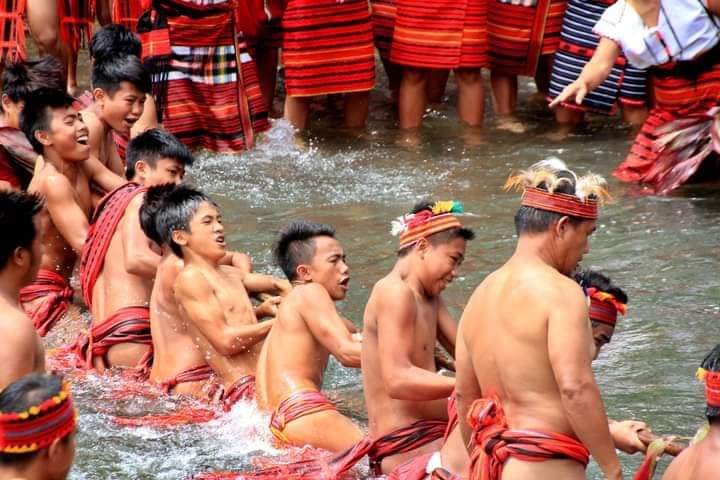According to to Ifugao creation myth, the Ifugao gods created the heavens and earth way before they created man. When men were finally created most for the Gods had no interest in them and the patient god Wigan-i-abunyan was told he watch of them. The first men were ill suited for their environment and Wigan-i-abunyan sent his son Kagibat down to earth to show man how to use fire and build houses. When he returned he was so enthusiastic about what he saw that his sister Bugan descended to earth to teach men how to use the forces of air and water. Her report was equally glowing as that of Kagibat. Soon Kabunyan, the God of the Sun, Stars and Sky wanted to visit earth and see what all the fuss was about. But, from his vantage point in the sky he couldn’t see anything so he moved in closer. With the sky so close to the earth, men had to hunch over and soon they couldn’t even work. The nearness of the sun caused rivers to dry up and the crops to burn up. [Source: “Vanishing Tribes” by Alain Cheneviére, Doubleday & Co, Garden City, New York, 1987.
At this time the world still part of heaven. Mankind was having such a hard time they tried to tell Kabunyan to go away, but he couldn’t understand their language. Finally an old woman who was so short she could stand up without having to hunch over started to mash some rice with a mortar and pestle. The pestle hit Kabunyan on the upswing to which god replied if you do that again I’m going to leave. The woman was deaf and because she could hear him she did hit him again. Kabunyan was annoyed by this he returned to heaven. The people were happy the sun and sky had returned to their normal position and from then on the sky and the earth have always been separated.

𝘓𝘦𝘵’𝘴 𝘨𝘦𝘵 𝘵𝘰 𝘬𝘯𝘰𝘸 𝘰𝘯𝘦 𝘢𝘯𝘰𝘵𝘩𝘦𝘳 𝘵𝘩𝘳𝘰𝘶𝘨𝘩 𝘰𝘶𝘳 𝘴𝘵𝘰𝘳𝘪𝘦s!
𝗧𝗵𝗲 𝗜𝗳𝘂𝗴𝗮𝗼 𝘁𝗲𝗹𝗹 𝘁𝗵𝗶𝘀 𝘀𝘁𝗼𝗿𝘆 𝗼𝗻 𝘁𝗵𝗲 𝗼𝗿𝗶𝗴𝗶𝗻 𝗼𝗳 𝘁𝗵𝗲 𝗺𝗼𝘂𝗻𝘁𝗮𝗶𝗻𝘀![]() : Kabigat, the first son of the god Wigan, once went from the Sky World (Hudog) to the Earth World to hunt with dogs. As the earth was then entirely flat, his dogs ran much from one side to another, pursuing the quarry, and this they did without Kabigat hearing their barking. Kabigat said: “I see that the earth is completely flat, because there does not resound the echo of the barking of the dogs.” After thinking for a while, he decided to return to the heights of the Sky World. Later on, he came down again with a very large cloth, and went to close the exit to the sea of the waters of the rivers, and so it remained closed. He later went to Baiyuhibi, the god of rain, who brought together his sons and bade them to rain without ceasing for three days until they finally stopped. Wigan told his son Kabigat to remove the stopper he had placed on the waters, and he did. When the waters that had covered the earth began to recede, there rose up mountains and valleys, formed by the rushing of the waters. * The Ifugao are an ethnolinguistic group that live in the province of the same name, where 10 out of 11 municipalities are predominantly indigenous. There are three main subgroupings: Tuwali, Ayangan, and Kalanguya or Kallahan. The group was originally called “Ipugaw” (later spelled by the Spanish as “Ifugao”). This name originated from the ritual stories of the people, where Wigan ad Kabunyan (Wigan of the Skyworld) was differentiated from Wigan of the Earth (Ipugaw). The prefix I— means “people of,” and pugaw referred to the cosmic earth.
: Kabigat, the first son of the god Wigan, once went from the Sky World (Hudog) to the Earth World to hunt with dogs. As the earth was then entirely flat, his dogs ran much from one side to another, pursuing the quarry, and this they did without Kabigat hearing their barking. Kabigat said: “I see that the earth is completely flat, because there does not resound the echo of the barking of the dogs.” After thinking for a while, he decided to return to the heights of the Sky World. Later on, he came down again with a very large cloth, and went to close the exit to the sea of the waters of the rivers, and so it remained closed. He later went to Baiyuhibi, the god of rain, who brought together his sons and bade them to rain without ceasing for three days until they finally stopped. Wigan told his son Kabigat to remove the stopper he had placed on the waters, and he did. When the waters that had covered the earth began to recede, there rose up mountains and valleys, formed by the rushing of the waters. * The Ifugao are an ethnolinguistic group that live in the province of the same name, where 10 out of 11 municipalities are predominantly indigenous. There are three main subgroupings: Tuwali, Ayangan, and Kalanguya or Kallahan. The group was originally called “Ipugaw” (later spelled by the Spanish as “Ifugao”). This name originated from the ritual stories of the people, where Wigan ad Kabunyan (Wigan of the Skyworld) was differentiated from Wigan of the Earth (Ipugaw). The prefix I— means “people of,” and pugaw referred to the cosmic earth.

